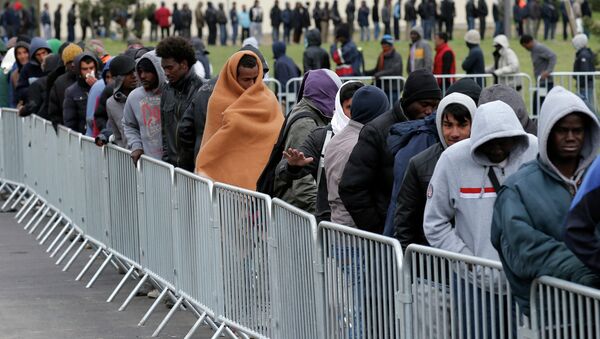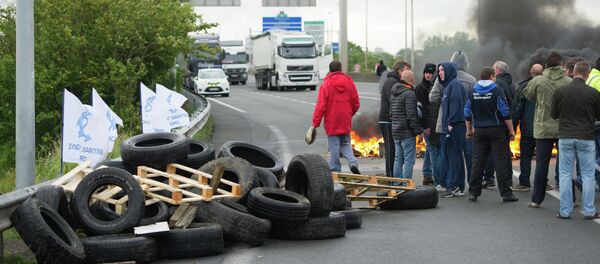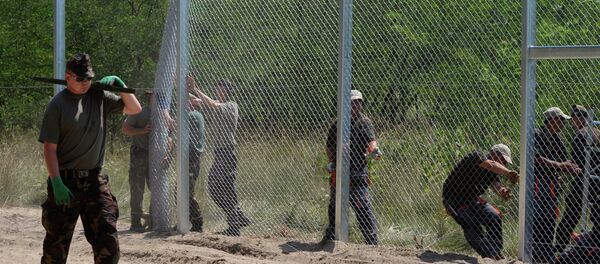British officials, along with French authorities, have been criticized for their perceived inability to handle the wave of immigrants determined to find a way across the English Channel.
A Wider European Problem
However, a detailed look at the broader issue of migration across Europe shows that it's not just the failings of the British or French authorities that have led to such a crisis, with similar humanitarian problems in many of parts of the EU.
While the estimated 3,000 migrants living in makeshift camps near the French port city of Calais consistently generates international headlines, there are several other similar situations across Europe, where asylum seekers are putting their lives at risk in search of a better life.
French police remove up to 1000 asylum seekers/migrants a day from back of trucks bound for UK http://t.co/Tq9vDqiDt3 pic.twitter.com/oxfU8qM277
— Gerry Simpson (@GerrySimpsonHRW) July 27, 2015
In April, 900 asylum seekers, en route from Libya to Italy, died after the boat they were traveling in capsized in the Mediterranean.
This tragic news shocked many people around the world and triggered the EU into action, with leaders meeting for crisis talks on how they could prevent the number of people taking the dangerous journey to Europe by sea.
However, the problems are not isolated to Italy, with many asylum seekers from war-torn Middle Eastern countries like Syria and Iraq arriving in Greece.
Europe's Migration Policies 'Failing'
A recent report by Amnesty International found that due to a combination of poor planning and an ineffective use of EU funds, combined with Greece's economic crisis, many asylum seekers arriving in the Greek islands were confronted with less than satisfactory conditions on arrival.
"These are refugees, not migrants, arriving in their thousands on Greek shores" http://t.co/FC1KmcsXoo pic.twitter.com/zDXlc6x8CX
— Andrew Stroehlein (@astroehlein) July 28, 2015
Despite the failings of the Greek authorities, John Dalhuisen, Amnesty International's director for Europe and Central Asia said that ultimately the migrant crisis is a product of the EU's approach to migration.
"The humanitarian crisis in the Aegean is not merely a Greek tragedy but the product of a failing European migration system."
He said that it was up to EU leaders "to acknowledge that the intolerable strains on frontline states such as Greece and Italy are the product of Europe's failed migration policies.
"Effective solutions to meet the global refugee crisis and share the responsibility more equitably across the EU must be urgently applied."
Critics argue that the EU's policy of placing the main responsibility for processing asylum seeker applications on the first EU country of entry, along with the limiting of safe and legal methods of entry to Europe, has put an unsustainable strain on some of the EU's outlying countries such as Italy and Greece.
The lack of legal avenues of settling in Europe has also been considered to be a major reason why many asylum seekers are willing to risk their lives to enter the EU, either by land or sea.
Concerns Over Human Trafficking
Due to the overwhelming demand for people from war-torn countries to try and seek asylum in Europe, there has been a proliferation in organized gangs and human traffickers profiting from the illegal transportation of people into the continent.
In France there have been reports of unemployed locals being approach by crime gangs to take part in people smuggling activities across the English Channel, while in eastern Europe concerns are being raised about people being abused by crime gangs, who promise desperate asylum seekers a passage into the EU.
It has led to many people becoming stranded in what's been described as the "overflow sink" of Balkan countries like Serbia and Macedonia, as many asylum seekers aren't able to legally enter EU countries.
While the immigration policies of these Balkan countries have also been criticized, campaigners point out that the reason for Europe's migrant crisis is ultimately down to the failings of the EU to come up with a sustainable approach to immigration.






